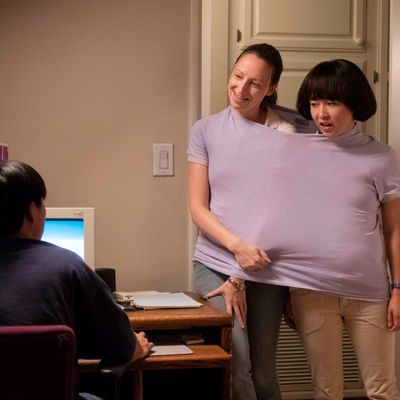
Things are bad at home for Anna, and they have been for a long time. Her parents’ fights may lack specificity, but the broad outlines we’ve seen suggest all kinds of trouble: drinking problems, money problems, a fighting-and-fucking dynamic that’s as uncomfortable when they’re “happy” as when they’re warring. Even at the start of this episode, when the Kones tell Anna that they’re going to a couples’ retreat to work on their marriage, they can’t keep it from devolving into a fight.
The power of “Anna Ishii-Peters” comes from all the small moments the show has built up in previous episodes, as an adrift Anna looks to any other parent she can find for approval. Those hardcore parent-pleaser tendencies might look harmless from a distance, but they feel very different when it’s your parents, as Maya quickly discovers. Like most kids, she’s used to casually abusing her family, secure in the knowledge that they’ll love her no matter what. When someone comes in and actually starts being nice to them — even, and especially, Shuji — that security is suddenly threatened.
The episode charts all of the highs and lows of a kid having a close friend over for a longer-term stay. At first, Anna and Maya are ecstatic to be “sisters,” running heedlessly around the house, wearing matching outfits, even pretending they’ve fused into a single person. But once the honeymoon ends, it really ends. Maya wants to keep being the same blissfully selfish kid she’s always been. But held up against Anna, who’s eager to help cook dinner and do dishes if it means getting a few crumbs of parental approval, she’s suddenly the “bad kid.” It’s enough to make Maya see her best pal in a different light.
As always, the show is emotionally meticulous, charting each little moment of Anna’s quiet desperation and Maya’s envy as it ever-so-slowly builds to a big blow-up at the end. Anna constantly compliments the Japanese food Maya hates; when Maya’s dad congratulates Anna on the musical skills Maya wishes she had, Maya is bereft. Watching her mom brush Anna’s hair, Maya suddenly sees Anna with dark hair, literally taking her place. When Mrs. Ishii gives Anna the last Oreo in the house, she might as well have snatched that Oreo from Maya’s mouth.
Yet the show carefully refuses to choose sides, letting viewers bathe indiscriminately in the unique flavor of each girl’s suffering. Even when they get into a fight at school over the ownership of a favorite carrot eraser, it never reveals who’s actually right. Instead, we see them both punished equally, called out and separated in class by the same mean teacher who mocked Anna’s botched racial-equality scheme.
The fight follows them home, when Maya, finally having hit the limit of her patience, unleashes on her mom and on Anna. “You have your own family,” she yells. “Can you go back to your own family?” Before the conflict can be resolved, Anna’s real family arrives to pick her up, and the girls are left to process the fallout on their own.
Maya’s meltdown leads to a touching scene between her and her mom, all the more so because the role is played, in a Master of None–esque casting move, by her real-life mom Mutsuko Erskine. Mrs. Ishii has told Maya that she’s not a little girl anymore, trying to prod her out of her selfishness so she can see how much Anna’s hurting. What she doesn’t know is that Maya has just gotten her first period, confirming that she actually isn’t a little girl anymore — at the exact moment she most needs her mom to comfort her.
Yet Maya has no idea how fortunate she is in comparison to Anna. Still reeling from Maya’s criticism, Anna gets plunked down for The Talk by her parents, who’ve finally decided it’s time to get a divorce. Anna Konkle is absolutely exquisite in this scene, registering a perfect moment of, “Yeah, I knew this was coming,” before the news really hits her and she dissolves into sobs.
This is the kind of moment that makes or breaks a friendship, and when Anna calls Maya for reassurance, she doesn’t answer. (Maya and her mom are asleep together in bed, both worn out from their confrontation.) So instead, Anna pulls out the school phone book and dials up Heather, who’s actually there. And just like that, Anna and Maya might go from sisters to not speaking.
All in all, it’s another brutal episode, and the final scenes left me in tears. But it still has piles of the show’s deeply weird humor, the quality of which I feel like I maybe haven’t emphasized enough amidst its beautiful evocations of the rough stuff. Watching Konkle pretend to scat with Richard Karn (whose Home Improvement role was a big part of my media diet in that era), or Maya play “go to your room” chicken with him, is a delight.
These sad stories hit all the harder because of the way Erskine and Konkle are able to commit to playing real, fully alive kids, full of silliness and incapable of inauthenticity. Just like real kids, the intensity of their joy is so palpable, it makes it unbearable to see them cry.

